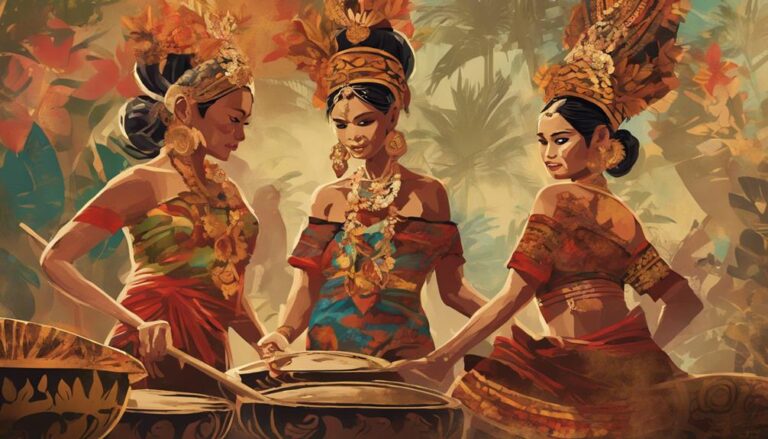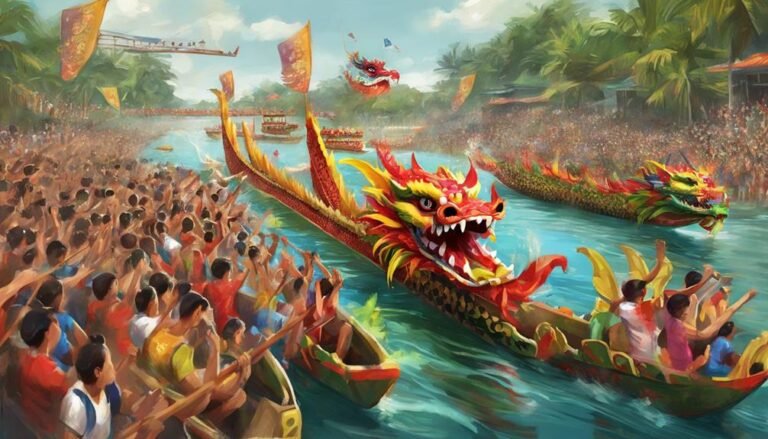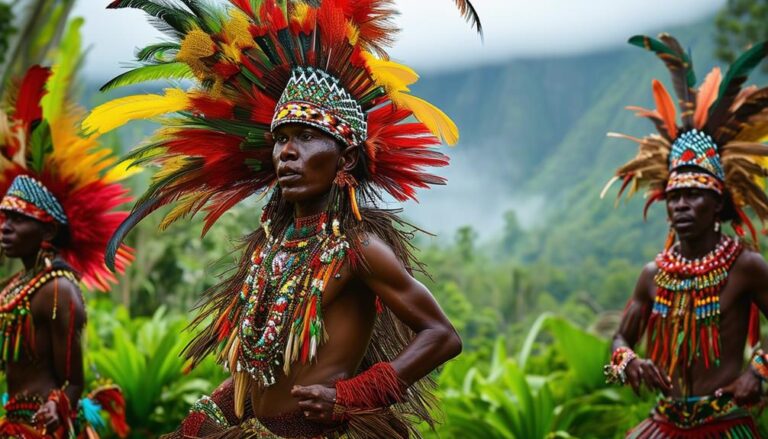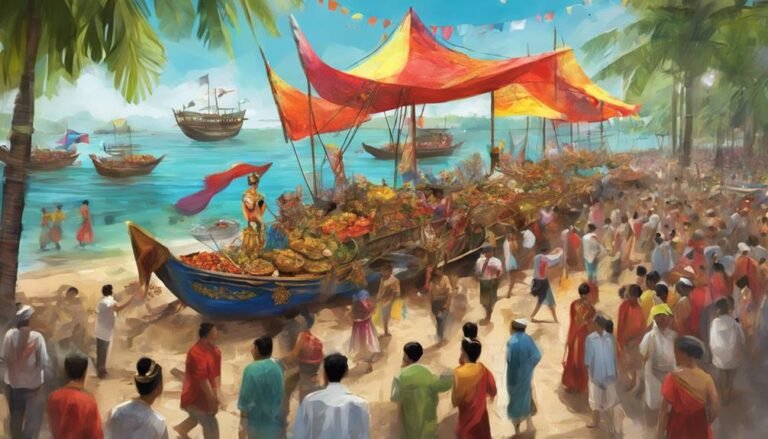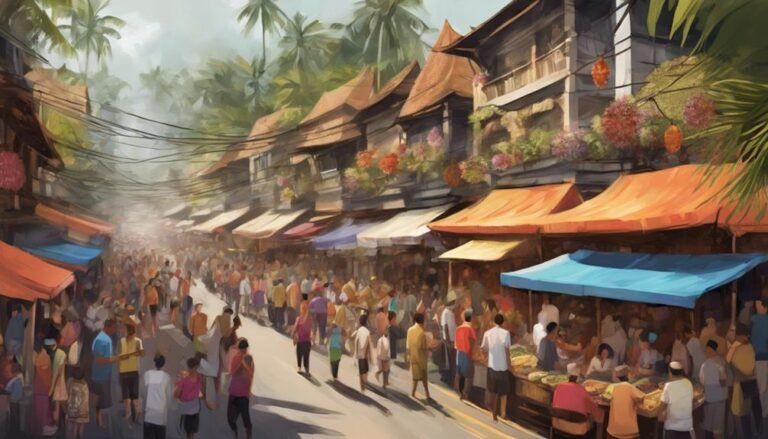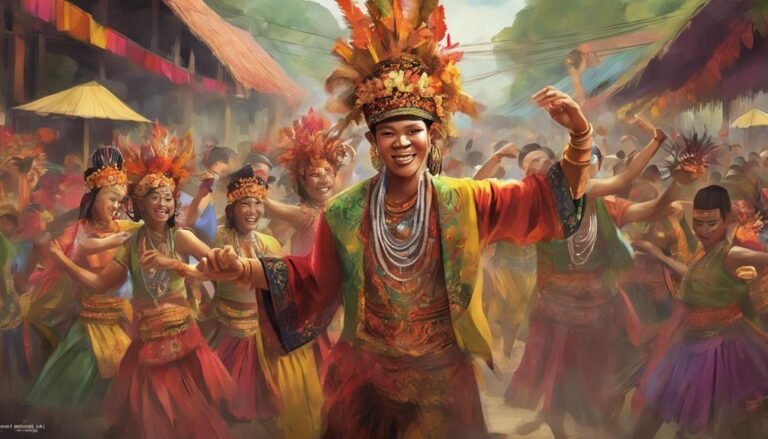Karapan Sapi (Bull Racing Festival)
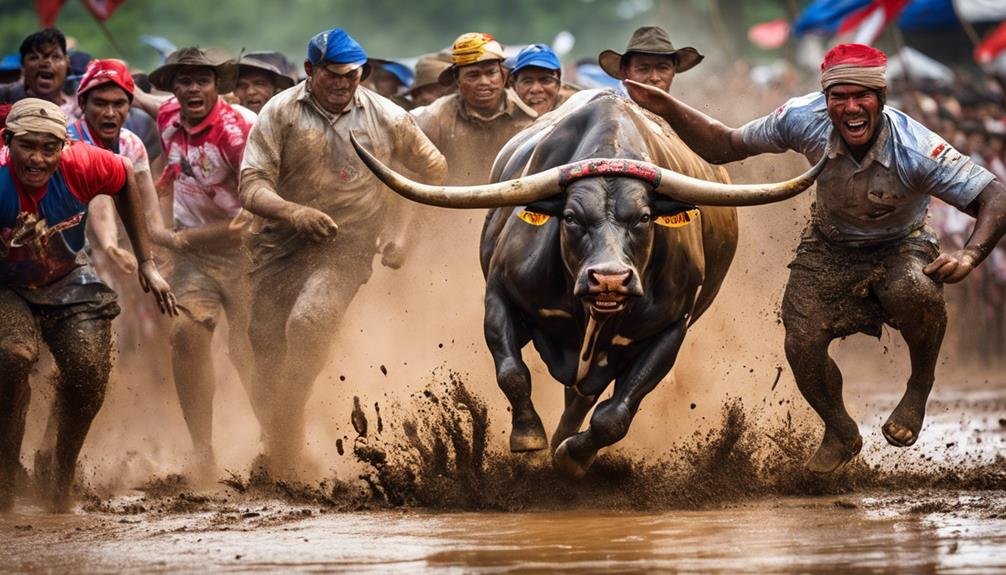
Step into the vibrant world of Karapan Sapi, where bulls showcase their agility and skill in a grand festival. Witness the rich traditions of Madura, Indonesia, as participants train rigorously and community members come together in celebration. The event not only honors heritage but also fosters economic growth and cultural exchange. The atmosphere is alive with cultural performances, traditional food aromas, and the thundering excitement of racing. Discover the deep-rooted significance of this centuries-old tradition and get ready to be immersed in a mesmerizing cultural experience that will leave you enthralled.
Key Takeaways
- Centuries-old tradition in Madura showcasing bull racing skills and agility.
- Participants undergo rigorous training for the competition.
- Honors the heritage of bull racing in Madura, passed down through generations.
- Festive atmosphere with enthusiastic local community support.
- Significant impact on tourism and economy, boosting local businesses.
Origin and History
Originating in Madura, Indonesia, before the 15th century, the Bull Racing Festival, also known as Karapan Sapi, has a rich history deeply intertwined with village traditions and the Madurese cultural heritage. In its early beginnings, the festival served as a way to celebrate successful harvests and exhibit the strength and agility of the robust cows.
Introduced by Syeh Ahmad Baidawi, the practice of bull racing initially involved bamboo sleds for the races, showcasing a blend of tradition and innovation. Throughout its historical evolution, Karapan Sapi has undergone changes in rituals, cow sizes, decorations, and the roles of participants like the Penjaghe.
The festival's roots in village life have contributed to its enduring significance, with each race embodying a connection to Madurese identity and values. The evolution of this tradition reflects not only changes in techniques and equipment but also the preservation of cultural heritage through a cherished sporting event.
Cultural Significance
As you witness the Bull Racing Festival, you'll see more than just a race; it symbolizes the deep-rooted traditions and communal ties of the Madurese people.
The festival serves as a living connection to the past, where the intricate rituals and decorations on the cows showcase the rich cultural heritage of the region.
Through this event, the Madurese community comes together to honor their history, creating a vibrant mosaic of tradition and unity.
Symbol of Tradition
The Bull Racing Festival, Karapan Sapi, stands as a revered symbol of tradition within the rich cultural fabric of Madura, Indonesia. This festival is deeply rooted in the Madurese traditional heritage, reflecting the community's strong ties to its agricultural roots.
Through Karapan Sapi, the Madurese people honor their history of utilizing bulls for farming, showcasing the skills and agility required for plowing fields in the past. The event serves as a vibrant display of cultural pride, with jockeys skillfully guiding pairs of cows through muddy fields with bamboo yokes at astonishing speeds.
The festival not only celebrates the Madurese identity but also attracts visitors, both local and international, fostering economic growth and cultural exchange in the region.
Community Bonding Ritual
In the vibrant fabric of Madurese cultural traditions, the Community Bonding Ritual surrounding the Bull Racing Festival emerges as a significant reflection of shared heritage and collective strength. This cultural celebration fosters communal unity through ritual blessings and spiritual connection.
The Ubo rampe ritual with saronen music historically invoked blessings and good fortune, setting the stage for the races. The use of large-bodied cows in Karapan Sapi races not only showcases strength and agility but also symbolizes status and prestige within the community.
Penjaghe from Ponorogo play an important role in ensuring cow safety, preventing cheating, and maintaining order during the event, highlighting the significance of their presence in upholding the integrity of the races and fostering a sense of togetherness.
Festivities and Events
As you wander through the bustling festival grounds, you'll be captivated by the vibrant cultural performances and displays that showcase the rich heritage of the Madurese people.
The aroma of traditional food offerings wafts through the air, tempting your taste buds with flavors unique to this region.
The thundering hooves of bulls racing in the muddy fields create an atmosphere of excitement and anticipation, drawing you closer to witness this thrilling spectacle.
Cultural Performances and Displays
Amidst the vibrant atmosphere of the Bull Racing Festival, immerse yourself in the dynamic cultural performances and displays that showcase the rich traditions of Javanese music and dance rituals.
- Elaborate cow decorations exhibit intricate artistic expressions and craftsmanship, reflecting the attention to detail and creativity of the local artisans.
- The presence of Penjaghe from Ponorogo guarantees the implementation of safety protocols and the maintenance of order, ensuring a fair and controlled environment during the races.
- The involvement of Madurese individuals as Penjaghe demonstrates the evolving dynamics of the event, as traditional roles adapt to the changing landscape of Karapan Sapi.
Traditional Food Offerings
Immerse yourself in the vibrant array of flavors and aromas at the Bull Racing Festival where traditional food offerings add a delicious dimension to the festivities and events. Local delicacies like Sate Madura, Lontong Balap, and Rujak Cingur contribute to the festive atmosphere, enticing both locals and visitors alike.
As you meander through the bustling streets, vendors beckon you to try dishes such as Rawon Sapi, Soto Madura, and Sate Kerang, satisfying your hunger as you take in the excitement of the event. Indulge your sweet tooth with traditional desserts like Jenang Madura, Klepon, and Lupis, showcasing the rich culinary heritage of Madura.
From savory treats like Soto Madura and Nasi Bebek Madura to flavorful snacks like Tahu Campur and Lontong Kikil, the food stalls offer a taste of local street food culture at Karapan Sapi.
Exciting Bull Races
Meandering through the vibrant festival grounds at Karapan Sapi, your senses are instantly captivated by the exhilarating sight of jockeys racing pairs of cows through the muddy fields, creating an electrifying atmosphere for all spectators.
- The cultural celebration of Karapan Sapi showcases the deep-rooted local pride of the Minangkabau people in West Sumatra.
- The adrenaline-fueled races, where jockeys skillfully maneuver the cows using bamboo yokes, offer a unique and thrilling experience.
- Unlike conventional competitions, the value gained by jockeys in the market is based on their cows' performance, adding an intriguing twist to the festivities.
Immerse yourself in this dynamic and culturally rich experience, where tradition and excitement blend seamlessly, leaving all attendees in awe of the vibrant spirit of Karapan Sapi.
Racing Rules and Traditions
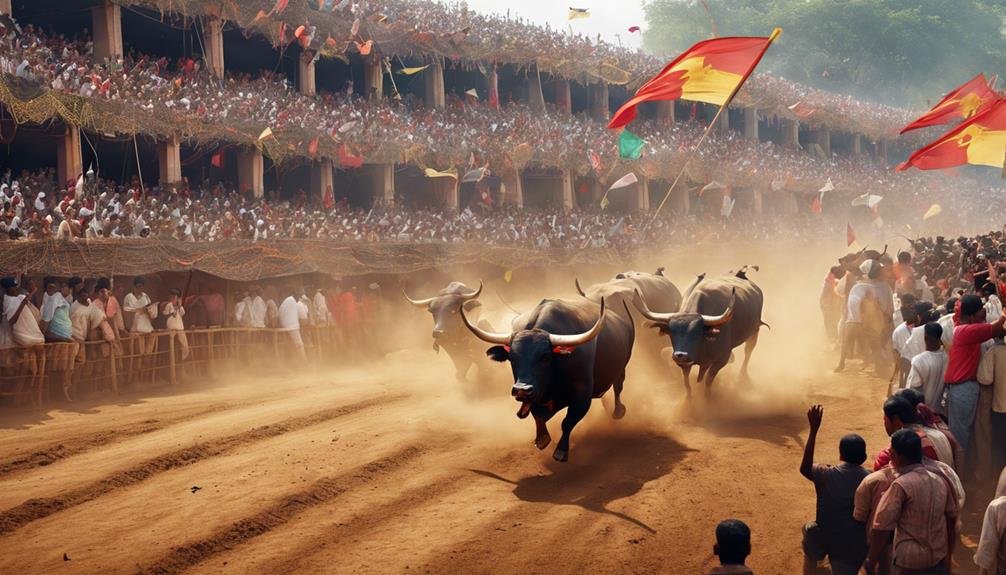
Racing Rules and Traditions in Karapan Sapi hold a deep-rooted significance in Madura's cultural heritage, showcasing a unique blend of skill, tradition, and value. Jockeys in Karapan Sapi exhibit remarkable techniques, riding pairs of cows through muddy fields while using bamboo yokes to steer them at full speed. Their adept maneuvering and loud yells guide the cows through challenging mudplumes, displaying a deep understanding of cow behavior and racing tactics.
In addition, the price value of the cows increases based on their performance in the race, adding an intriguing dynamic to the event. Furthermore, the event's betting culture and audience engagement add an element of excitement and community involvement, making Karapan Sapi not only a race but a cultural celebration where tradition, skill, and values intertwine harmoniously.
Community Participation
As the Karapan Sapi festival unfolds, the vibrant mosaic of community participation weaves together the essence of Madura's cultural heritage.
- Community Engagement: At the heart of the event lies the active involvement of community members who dedicate their time and effort to train and prepare the cows for the exhilarating races. This hands-on approach not only showcases their deep connection to the tradition but also highlights the unity and collaboration within the community.
- Cultural Preservation: Owners of the racing cows play an important role in preserving the cultural significance of the festival by carefully selecting and pairing the animals for the competition. This traditional practice not only honors the heritage of bull racing in Madura but also ensures that these customs are passed down through generations.
- Supportive Spectators: The enthusiastic presence of spectators from local communities adds to the festive atmosphere as they gather to cheer on the racers and partake in the celebration of this time-honored event. Their unwavering support and engagement help sustain and promote the rich cultural legacy of bull racing in Madura.
Impact on Tourism and Economy
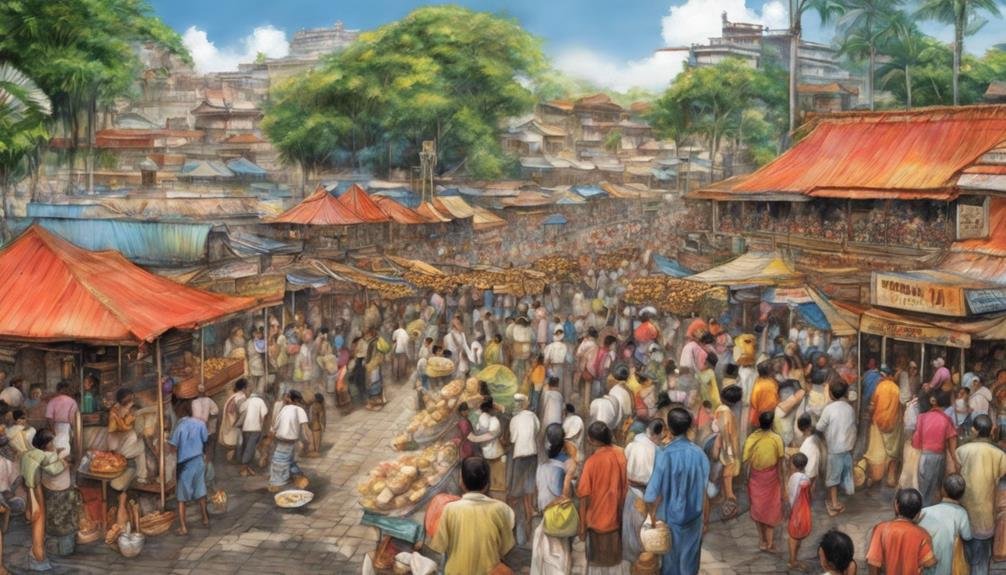
The influx of visitors during the Karapan Sapi festival invigorates the local economy and enhances the tourism landscape of Madura. The streets buzz with excitement as domestic and international tourists flock to witness the thrilling bull races, injecting a significant tourism boost into the region. The economic impact is palpable, with local businesses flourishing from the surge in demand for accommodations, food, and souvenirs. The festival serves as a catalyst for economic growth, providing opportunities for entrepreneurs to showcase traditional crafts and delicacies, further enriching the cultural fabric of Madura.
As visitors immerse themselves in the festivities, cultural exchange flourishes, fostering a deeper understanding between the Madurese community and tourists. The shared experience of witnessing the bull races creates a sense of unity and pride among the locals, showcasing the resilience and vibrancy of Madura's cultural heritage. Through Karapan Sapi, traditional practices and values aren't only preserved but also celebrated, strengthening the cultural identity of this enchanting island.
Frequently Asked Questions
Are There Any Age Restrictions for the Bulls Participating in Karapan Sapi?
In bull racing events, age restrictions guarantee the bulls' welfare. Younger bulls may lack the physical maturity needed for such races, risking their well-being. Setting age limits helps promote fairness and safety for these magnificent animals.
How Are the Bulls Trained for the Bull Racing Festival?
To train bulls, handlers use various techniques such as positive reinforcement, physical conditioning, and repetition. Traditional methods like gentle guidance and reward systems are employed. Through these practices, bulls are prepared for events like bull racing festivals.
Is There a Specific Significance Behind the Colors of the Jockeys' Attire?
In traditional settings, the colors of jockeys' attire hold significant meaning. These hues often symbolize cultural practices, values, and histories. Understanding the deep-rooted significance behind the colors adds richness and authenticity to the event.
Do Spectators Have the Opportunity to Interact With the Bulls or Jockeys?
You can observe the jockeys skillfully guiding the bulls and witness their bond in action. While you may not directly interact with the bulls or jockeys, the thrill of watching the race up close is an unforgettable experience.
Are There Any Specific Rituals or Blessings Performed Before the Races Begin?
Before the races begin, traditional blessings and rituals are performed, highlighting the cultural significance and spiritual preparation. These ceremonies add depth and meaning to the event, enriching the overall experience for participants and spectators alike.
Conclusion
As you witness the exhilarating karapan sapi festival, you can feel the pulse of tradition and community spirit.
The heart-pounding races, colorful ceremonies, and lively atmosphere showcase the deep cultural roots of this event.
The dedication of the participants and the cheers of the spectators create an unforgettable experience.
In this vibrant celebration, you can truly appreciate the unique blend of tradition, athleticism, and camaraderie that defines the karapan sapi festival.

